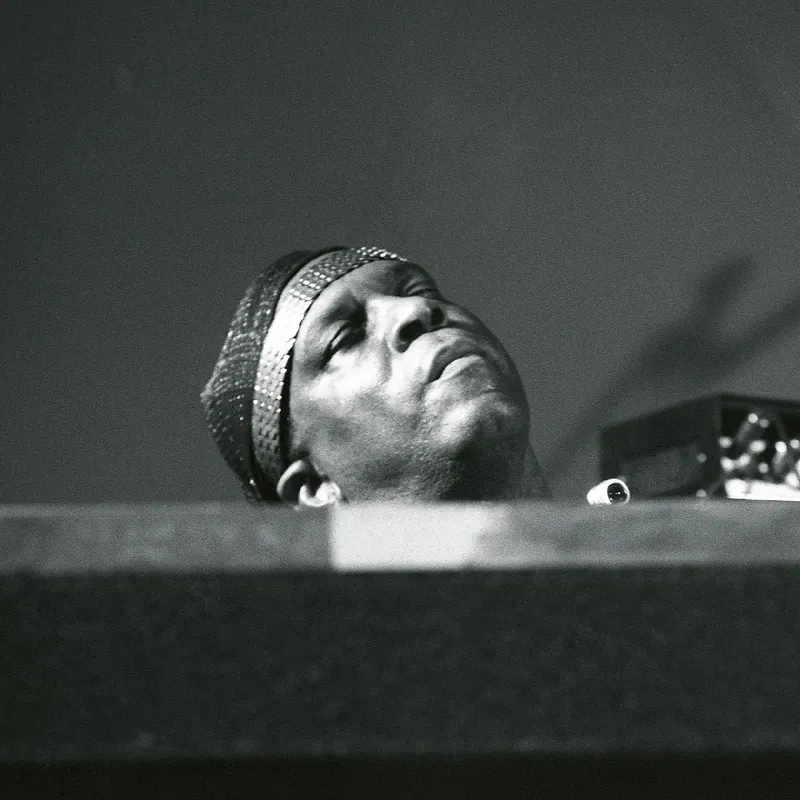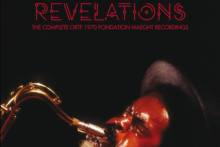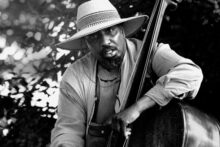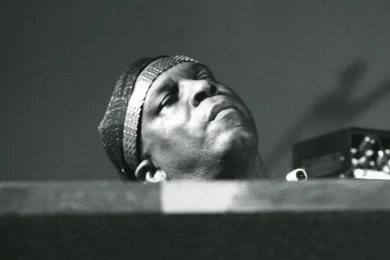A half-hour taxi ride inland from Nice on the Côte d’Azur, in the southeast of France, brings you to La Fondation Maeght, an art gallery and museum of modern art perched on a hill overlooking the town of Saint-Paul de Vence. Its interior is spacious and cool. Outside, you can wander among the silent sentinels in the sculpture garden or get lost in a marble, bronze and concrete labyrinth designed by Joan Miró. Afterwards, you can take a pot of tea on the terrace with the warm wind rustling the trees nearby. It’s a peaceful place.
But half a century ago, it resounded with some of the most challenging and progressive music being made anywhere in the world, culminating in two legendary late-night shows by Sun Ra and His Inter-Galactic Research Arkestra, now released in their entirety for the first time, as the 6-LP vinyl box-set Nuits De La Fondation Maeght.
La Fondation Maeght had been closely involved with the cutting edge of modern and contemporary art in all its forms since it was established in 1964 by art dealer Aimé Maeght and his wife Marguerite Maeght. Alongside painting and sculpture by Matisse, Chagall, Giacometti and Kandinsky, it had provided a platform for music, dance and avant-garde theatre with the Nuits de la Fondation Maeght festival. Beginning in 1965, the festival hosted contemporary classical works by Webern, Bartok, Stockhausen and others. But, in 1970, it was given an invigorating boost when the Maeghts enlisted the help of young music journalist Daniel Caux to curate that year’s event.
In July and August 1970, Caux staged the festival’s most radical edition yet. Presented in an experimental, inflatable structure designed by architect Hans-Walter Müller, it included concerts by US minimalist pioneers Terry Riley and La Monte Young, the latter performing with Marian Zazeela and Indian vocalist-guru Pandit Pran Nath. Caux also called upon two of the most iconoclastic artists in the jazz avant-garde. On 25 and 27 July, saxophonist Albert Ayler performed rapturously received concerts in a quintet with vocalist and soprano saxophonist Mary Parks, bassist Steve Tintweiss, drummer Allen Blairman and – on one of the gigs only – pianist Call Cobbs. Then, on 3 and 5 August, the festival closed with two extraordinary performances by Sun Ra and a sprawling 18-piece Arkestra.
It was some shrewd programming on Caux’s part. Though considered pioneers of free jazz, Ayler and Ra were both outliers, each with an utterly unique approach and aesthetic all their own that no other artist ever really came close to emulating: Ayler the prophet of apocalyptic folk-and-gospel infused sermons; Ra the cosmic philosopher of Nubians-in-space Afrofuturism. Moreover, the documentation of Ayler’s and Ra’s concerts have had remarkably similar histories. Both were recorded in their entireties by the French public radio station ORTF. Both had edited highlights released on two LPs by the Paris-based Shandar label in 1971, in both cases going by the title Nuits de la Fondation Maeght Volumes 1 and 2. Ayler’s two concerts were released in their full, unedited glory in the 4-CD box-set Revelations in 2022. Now, with Nuits De La Fondation Maeght, Ra’s shows get the same exhaustive treatment.
But it’s striking how accessible – crowd-pleasing, even – the Arkestra’s shows are, compared to Ayler’s. Sure, Ayler throws in a few songs with lyrics by his partner Mary Parks: tunes like ‘Heart Love’ and ‘Oh! Love Of Life’, which were part of his somewhat misguided attempt to reach wider audiences in his last years. Yet his concerts remain, for the most part, austere recitations of heart-wrenching seriousness. It’s also true to say that Ra’s shows contain plenty of fiery avant-garde action. Much of this emanates from Ra’s solo interludes. On piano, he remains a suis generis genius of spontaneous creation, drifting from wistful melodic daydreams to sudden irruptions of violent intensity and back again.
Around this time, at the turn of the 1970s, he had also begun his tumultuous explorations of the recently purchased Moog synthesizer. Here, Ra approaches the synth not as an electric guitar substitute, as contemporaries such as The Mahavishnu Orchestra’s Jan Hammer were then doing, but as a furious generator of alien sounds and timbres as though beamed in from some far galactic outpost. There are also group improvisations of boiling energy – often conducted by Ra using a lexicon of theatrical gestures – which forge ahead into the most coruscating free jazz, with saxophonists John Gilmore and Marshall Allen straining at the horn’s limits.
And yet, for all that, the shows the Arkestra presented at Fondation Maeght in August 1970 were approachable, enjoyable and, above all, fun. Across the four hours of music, a wide range of moods are touched upon. There are the many anthemic songs and chants – such as ‘Satellites Are Spinning’ and ‘We Travel The Spaceways’ – delivered in vocalist June Tyson’s sweet, down-home tones with enthusiastically ragged call-and-response choruses by the rest of the Arkestra spelling out Ra’s sci-fi philosophy. There are wafting space-ballads; muscular, big band hard-bop workouts; and percussion-heavy rainforest modal jams. Each of the two evening programmes feels like a meandering yet comprehensive journey into the deepest recesses of Ra’s imagination, calling in on all his obsessions and preoccupations.
Needless to say, the Arkestra’s shows were enormous successes, with dancers, lightshows and psychedelic projections further intoxicating the audience and causing a mind-blowing sensation. What’s really astonishing is that – a decade and a half after the Arkestra had first taken shape in Chicago in the mid-1950s – these were its very first performances outside of North America.
Since relocating to New York at the beginning of the 1960s, Ra et al had weathered times of extreme poverty and lack of opportunity, while clinging to an uncompromising vision of music’s liberating potential. These debut European shows heralded the beginning of a new and long-overdue era of greater visibility, renown and respect which – as for so many of the eternal avatars of jazz – were more readily available across the Atlantic than they were at home in the States. The Arkestra in 1970 was not only at the height of its powers, it was also the first true incarnation of the much-loved, globe-trotting Arkestra that Marshall Allen has led so successfully into the 21st century. It all starts here.






